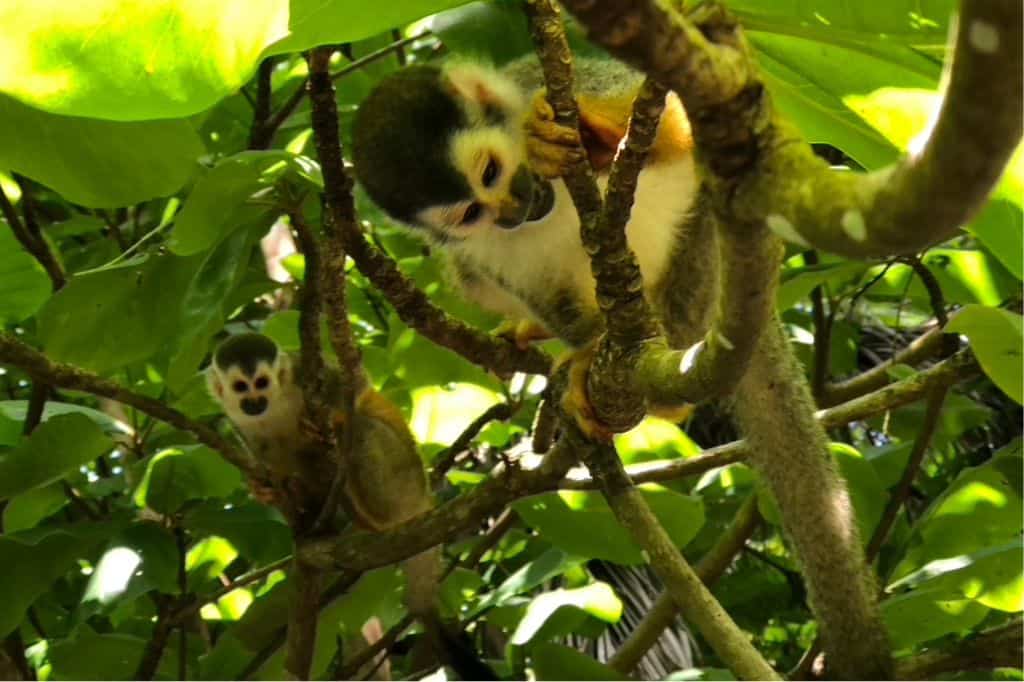
Imagine trading the fast-paced life of the US for a serene tropical rainforest where your daily routine includes spotting colorful toucans and playful monkeys. This was Dawn Macaulay’s dream after her first visit to Costa Rica in 1999. The land of pura vida (pure life) quickly became her second home and drew her back for multiple visits per year. Dawn finally realized her dream of retiring in Costa Rica in 2023 when she and her husband, Scot, moved there full time after Scot retired from the US military.
Their days are filled with the beauty of Costa Rican wildlife, beaches, and sunsets: everything you’d expect from a paradise retirement. Yet, Dawn and Scot have also witnessed the country change due to a surge of North American and European expats, and life as full-time residents presents several challenges.
In this candid Q&A, part of our Expat Military Retiree Interview Series, Dawn shares the realities of retiring in Costa Rica. Learn about costs, healthcare, and how the influx of expats is reshaping the landscape — and discover what it all means for Dawn and Scot’s future plans.
Contents (click to expand)
Why did you decide to retire in Costa Rica?
I traveled to Costa Rica in 1999 and fell in love. The relaxed and friendly people, simple life, tropical rainforest and being surrounded by numerous species of wildlife were exactly my thing. I envisioned retiring here because it was very affordable and I could live large on the small government pension I would receive when I retired.
I returned in 2001 and fell into a situation to buy a little bungalow in the Manuel Antonio/Quepos area very cheap.
Fast forward to 2012 when I met my husband. He visited me in Costa Rica. He also fell in love with it. We knew from then on that our retirement plan was to move to Costa Rica.
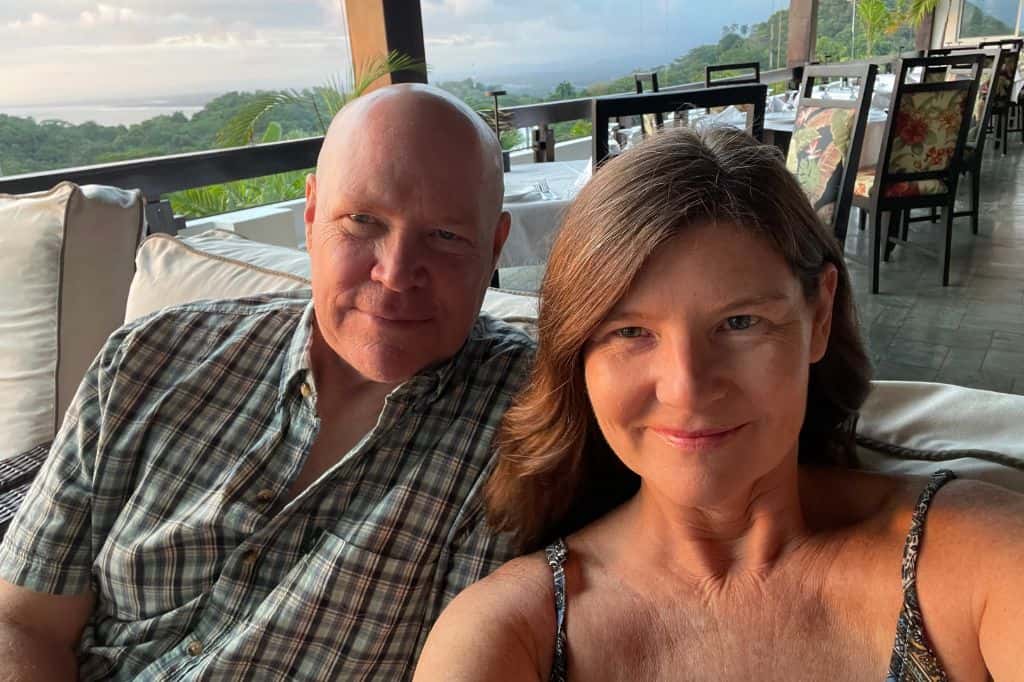
How did you choose the Manuel Antonio area?
I already owned the little house, so there wasn’t consideration for other locations in the country. I know the country well and there really isn’t another location that meets what we wanted here.
Not having a car is an important criterion, and many other locations would not be conducive to this. We travel around by bus, taxi and foot exclusively. I also chose Costa Rica for the wildlife, which we have in abundance in this area.
Tell us about the process for obtaining your residence visa to live in Costa Rica.
Our visa type is Pensionado. A person needs $1,000 per month as a minimum amount to qualify. Social security or some other form of guaranteed pension qualifies.
Government bureaucracy in Costa Rica can be difficult and not always logical, so most expats choose to hire an attorney to assist in the application process. Required documents include birth certificate(s), FBI criminal background checks, a marriage certificate for those filing as a couple, and a letter stating the guaranteed
pension. These documents must all have apostilles. The local attorney has the documents officially translated to Spanish.
Unfortunately, we were victims of a huge national fraud scandal, in which the legal firm, known as the best in the country at processing residency for expats, was shut down permanently by the government. The owner fled the country, did not refund money to thousands of customers, and left people hanging.
Many applicants had their application process fall apart, missing deadlines or documents needed to proceed to the next stage. People who waited as much as a couple of years had to start over.
We were lucky. We had paid recently enough to dispute with our credit card and had our money refunded. The fraudulent attorney has faced no consequences from the Costa Rican government, as he fled to Panama or the US, and victims have no recourse to pursue him.
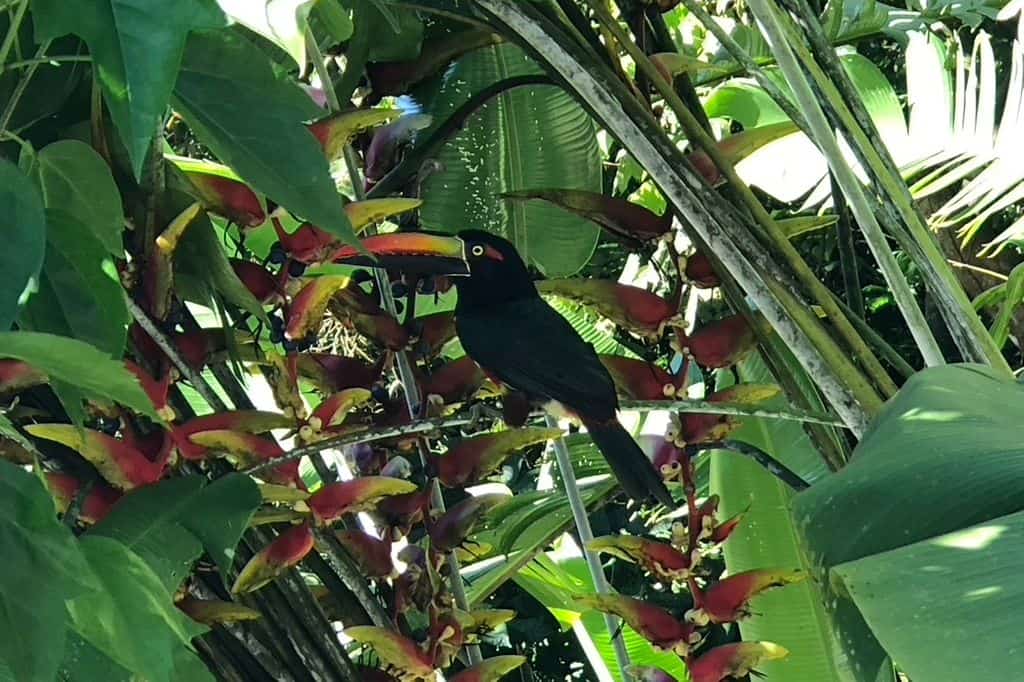
We found another attorney who was excellent. After starting the application process, applicants do not have to leave the country once the government receives the documents and determines that all required items have been submitted. This is called tramite status (in progress). It took 10 months for us to receive approval.
Next, our attorney sent an assistant to help us register for the Caja system (government medical/social security system). Legal residents are required to pay into it each month. You will receive medical coverage through the government system. The amount paid is based on the amount of the guaranteed pension that you declared, so if you have more than one pension, you choose the lowest one to pay the least amount.
The next step was getting a Dimex card, which is the residency identification card. The attorney sent an assistant to our town to complete this, too.
In 2 years, we are required to file to renew our temporary residency and in 5 years, we will be eligible for permanent residency.
The Costa Rican government recently extended the amount of time that tourists can stay without a visa from 3 months to 6 months. Now, many people are rethinking applying for legal residency. They are choosing to make “border runs” instead. Every 6 months, they leave the country and re-enter.
| Related Reading: Retiring in the Dominican Republic
Do you speak Spanish? If not, is it difficult to navigate daily life?
I speak a bit of basic Spanish. I took 12 credit hours of Spanish in college and was fairly good at it. I have also learned more vocabulary visiting and owning a house over the last 24 years. Talking with workers about repairs quickly demonstrated that colleges don’t teach many practical words needed to discuss everyday topics.
My husband studies regularly on Duolingo and has quickly increased his understanding of basic Spanish.
Ticos (Costa Ricans) are very kind and helpful when it comes to attempts to speak and learn their language. They take their time going back and forth to figure out what you are trying to say with a smile and seem to enjoy teaching you new words or gently correcting mistakes.
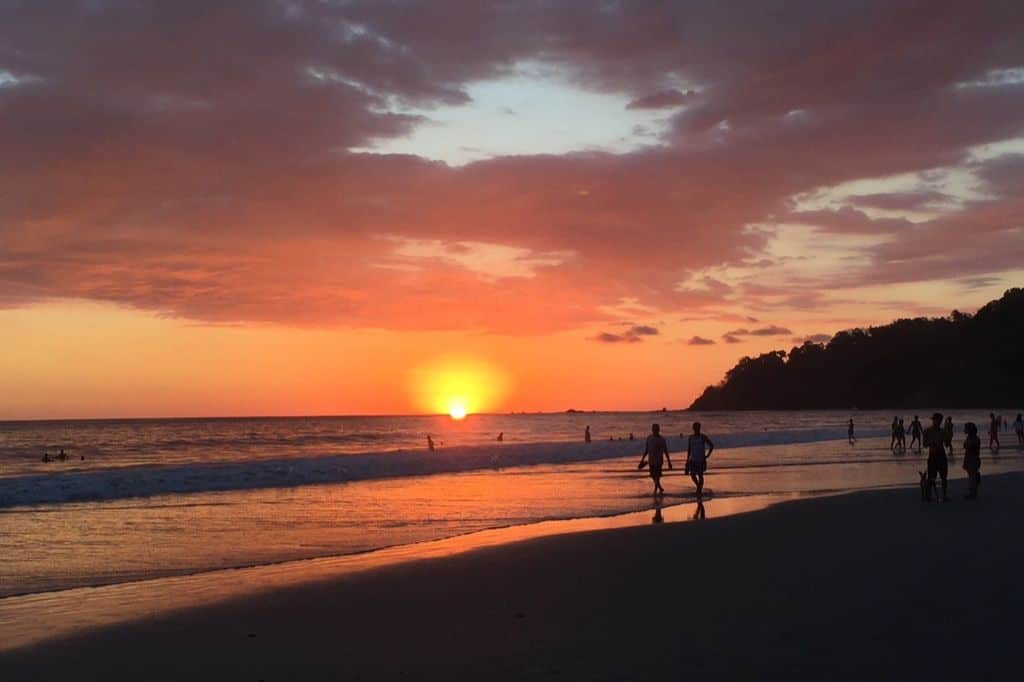
Another thing that we notice is that Ticos speak slower and more clearly than locals we met when visiting Spain. Many people speak English where we live, as it is a tourist town, so practicing Spanish is limited. But I still get practice with jovial taxi drivers, our gardener, at the hardware store, or some grocery stores.
Navigating something like government appointments, paying property taxes, or banking would present a problem for some without at least learning or rehearsing some basic phrases, but overall it isn’t too difficult to operate in Costa Rica using primarily English.
How does the cost of living in Costa Rica compare to the U.S.?
Costa Rica is not cheap. I find the cost of living to be similar to or more than the cost of living in the United States. Yet, the average salary in Costa Rica is $820 per month. This is mind-boggling to us, as people who live here and pay the prices.
The low average salary makes it seem like you could live in Costa Rica cheaply, but it doesn’t quite give the realistic picture of the lifestyle you could have on that income.
Do you want an American style house, with a modern kitchen, as we are accustomed to? Do aesthetics, sealed and closed homes, or a modern shower matter to you? The people making the average salary are living in Tico style homes, which do not have those features.
Living in areas inland that are not infiltrated with foreigners is more affordable. Coastal locations or modern suburbs and in the city will cost you much more.
We own our own home, a little shack in the rainforest. I can’t estimate accurate average utilities because we live in a simple, Tico style, open air dwelling with no air conditioning. Our cost for running a refrigerator, using a few lights, and charging devices is about $40 a month. We have no TV or cable but WiFi is about $60 a month.
We have condo fees of $180 a month to cover community expenses, as we jointly own land with others in a condominium community, though we have free-standing dwellings.
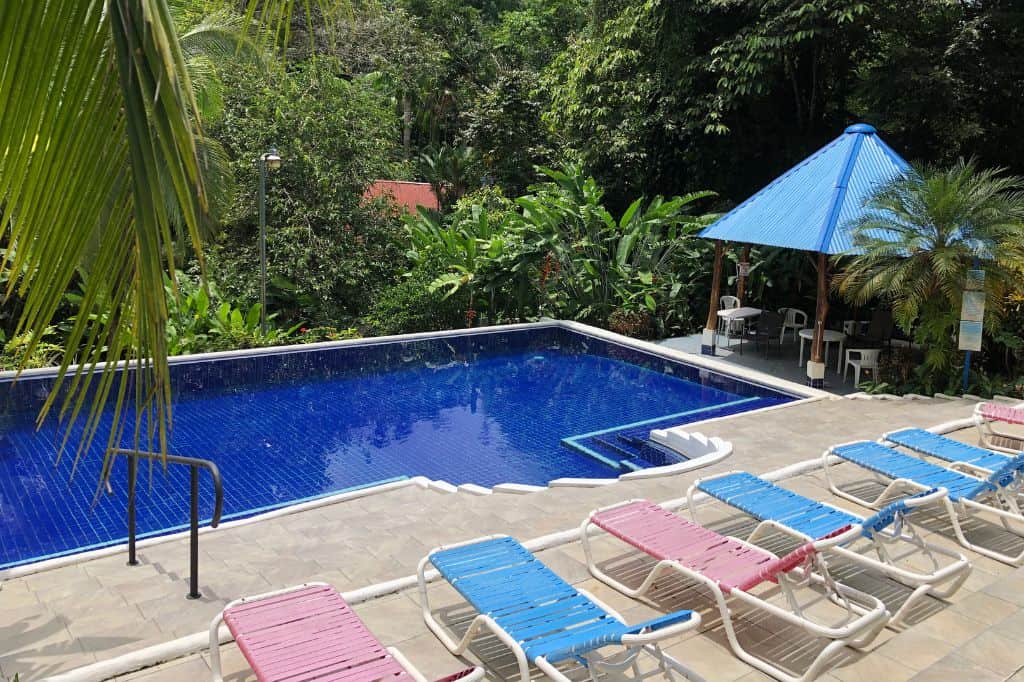
Groceries kill us. If you eat only locally-produced goods, you can eat cheaply, but it’s very limiting. Examples of local items include mahi mahi ($16 to $20 a kilo), tuna ($20 a kilo), and pineapple (about $1 to $1.20 each).
There are multiple other types of tropical fruits grown and sold here, and locals live on black beans and rice. There are some expats who don’t mind eating this simple local food on repeat.
We are big foodie people, so the same thing day in and day day out is not for us. Local brand products, such as bread or chips, are greatly inferior to our US standard. A 150g bag of local brand chips is $4. Local cheese is a strange tasteless variety to us, so there we are, splurging on insanely priced cheese.
Anything imported has a huge markup of at least 40 to 50% due to import taxes. We are big into wine. We have really limited, poor wine choices that are at least twice as much as elsewhere.
Examples of imported food items include Peter Pan peanut butter ($10.88), a can of artichoke hearts ($7), a box of soup stock ($10), a small jar of pesto sauce ($6 to $7), and a small jar of kalamata olives ($12).
Dinner out is very similar to or more than US prices. For example, on a recent night out at a regular nice restaurant, the Catch of the Day, mahi mahi, with a garlic cream sauce, mashed potatoes, and vegetables which was $16.50. Adding a margarita would be $8 to $12. For meat eaters, barbecue ribs were $22. There is an added 23% to your bill (13% tax and 10% service).
You could instead live like a local and stop in a little soda instead. Sodas are small local restaurants that serve almost the same menu of local dishes across the country. A casado is the most common dish, consisting of a small piece of meat or fish, rice, beans, and salad or vegetable, costing $6 to $8. We are not the type that can live on that. The local food is very bland, so we have to mix it up.
(Think you’ve found your next home overseas? Answer these 24 questions before you make the move.)
Do you have any tips for buying a house in Costa Rica?
You need an attorney to research the property well. There are plenty of English-speaking realtors, including expats.
A huge difference is that you can’t finance the purchase. You need to pay the full amount of the house. Occasionally, owners give some financing, but it is typically only on a small amount of the house price and for a short period of 5 years.
Building a home is said to be challenging because of “Tico time.” Life moves at its own pace here. Workers may move slower than they stated and building permits can be a long process.
How is the medical care in Costa Rica?
As a resident, you will be required to pay into the Caja (social security system), which will cover you in their local health system. This amount is calculated based on your claimed income if your residency is pensionado (based on a pension). We based ours on my pension because it is lower than my spouse’s. Our Caja costs about $220 a month and covers both of us.
The public health system is considered very good, but wait times are supposedly very long. Unless a procedure is needed to sustain life, expect a long wait.
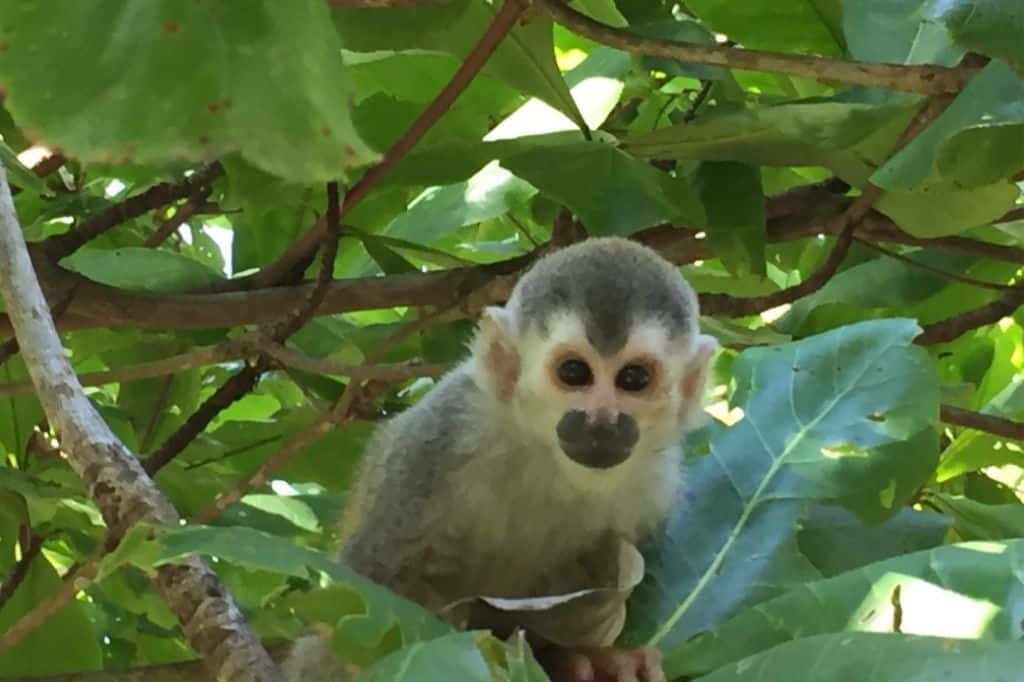
I doubt we will ever use the public health system unless something urgent occurs that requires us going to the local hospital. For example, if we get a venomous snake bite in the jungle, we are covered for quick antivenin at the local hospital.
There are quality private medical facilities in Costa Rica. You can utilize these and file your own claims with TRICARE, a huge perk for military retiree families.
| Related Reading: How TRICARE Works Overseas
There is a satellite clinic of Metropolitano hospital in our town. They have regular physicians every day, and some specialists on certain days. They have X-ray machines, ultrasound machines, lab capabilities, and a pharmacy.
There are also private facilities and hospitals in San Jose that cater to military retirees and veterans. We use CIMA hospital. CIMA is a Joint Commission International (JCI) accredited hospital and affiliated with a hospital in the United States.
CIMA has a VA coordinator. She will set you up to receive care after you provide the necessary documentation. She connects you with needed specialists, arranges your medications for pick up, and files claims with VA or TRICARE, whichever applies to your situation.
It should be clarified that the VA coverage is only for VA rated, service related conditions. Care and medication for those conditions are fully covered without costs to you.
I’m not the service member in our family but I have gone to CIMA for routine check ups, mammography, etc., paid for by TRICARE. The VA liaison sets me up, tells the department what my copay is, and files my claim for me.
Physicians we have seen all spoke English and have been excellent. The drawback is we have to take a 3 1/2 hour bus trip or 2 hour 45 minute car ride to reach the city for these appointments.
Does Costa Rica tax your military retirement or other US income?
We do not owe any taxes on our retirement incomes or VA benefits. There no taxes on US-sourced income.
Tell us about day-to-day life!
Our life here is pretty simple. We are not people who always need some sort of structure occupying our time, so we are content reading at home, listening to music, playing games, etc.
Wildlife watching is a daily occurrence, with three species of monkeys, sloths, scarlet macaws, toucans, tons of birds, lizards, and snakes at our doorstep. Yes, even
snakes! I study identification of snakes and animals on the side.
We have a beautiful pool on the grounds, so swimming surrounded by a beautiful tropical garden, flowers, and fruit trees is a plus. Sometimes, I like a nighttime swim to relax me before bed.
We have a beautiful beach down the road, so a day on the beach, sitting beneath the trees, reading a book with a picnic lunch is a nice outing. For a bigger splurge, we could sit on rented lounge chairs on the beach with restaurant food delivered.
Sunset viewing at one of our favorite restaurants for an evening out is high on our list of local pleasures. Observing a turtle release by a local who protects turtle nests is another activity.
Our community of expats has a WhatsApp group to come up with activities to rally people together to do activities such as ziplining, hikes, sunset cruises, etc. About once a month, there is a beach potluck organized for the group to get together to socialize. We also do a weekly trivia game at a small restaurant/bar called Thinking and Drinking.
Do you have many friends from the local population, or do you primarily socialize with other expats?
Most of our friends are expats from the US, Canada, and Europe. I wish that our Spanish skills were better to increase our connections with Ticos, because the language is a barrier. We have local connections, but they aren’t as deep as we would like.
I will say that I have encountered and observed that there is sometimes a barrier to meaningful relationships between gringos (expats) and Ticos in our area due to the discrepancy in income.
I have witnessed gringos thinking they are building friendships with locals, but later they find out the locals see the expat as someone who is loaded with money, who can just give and give to help them, not understanding that we have to watch our money carefully too. The question becomes: are they really your friend or do they see you as a dollar sign?
I think this is less of a common experience in the city and Central Valley where there is more of a middle class and not as big of a lifestyle difference between expats and locals.
Do you feel “accepted” in the local community?
I have never faced a feeling of not being welcome here, ever. I believe we are seen as a valuable part of society, in that the number one industry in Costa Rica is tourism.
Expats also bring money to the society by spending on restaurants, services, and activities. People are genuinely friendly, and we see that in our interactions here.
What do you like about living in Costa Rica?
We enjoy being away from the very divisive political climate in the US. We can still follow current events, stay informed and make our choices, but that tension of those differences in views isn’t emphasized and constantly shoved down our throats at every turn during social interactions. That is a huge sigh of relief.
We very much enjoy nature, green space, and the tropical, stable climate. We prefer a simpler life that isn’t focused on attaining material items, which is certainly the way of life here.
What are some of the challenges of living in Costa Rica?
A big challenge for us is bureaucracy and the lack of professionalism amongst “professionals.” Yes, there is what is called “Tico time,” which means everything is mañana (tomorrow), but at times, it’s extreme here.
An example is that we have waited for a property issue to get a plot plan on record at the municipality for 16 months. It was supposed to take around 3 months. This delay alone would be frustrating enough, because we cannot get a permit to do a renovation on our house without it. But add in that the surveyor will not communicate with us what is happening. What is the reason? What has gone wrong?
Attorneys and accountants often don’t explain things and they don’t do their work promptly. Also, they expect you to know what needs to be done, and then prompt them. They often don’t answer questions or provide receipts. It’s mind-boggling.
Add in that the Costa Rican government has been known to make bureaucratic requirements at the last minute with a quick deadline. Yet, the government can’t even implement the process they made you rush to complete.
If you read this and say, “Oh, this is like Europe,” no. It is way more of an obstacle in life than in Europe.
Do you have advice for anyone thinking of moving to Costa Rica?
I would suggest renting first, rather than buying a house. This will allow you to experience the pocket of Costa Rica you choose and to find the right fit. It will also give you the ability to move more easily if you change your mind.
What are your longer-term plans? Do you intend to live in Costa Rica for the foreseeable future?
Costa Rica has been a huge part of my life for 25 years. It is part of who I am, but we have decided to leave.
We always planned to travel a few months per year. The reality of the amount we spend for the the things we love, such as food and wine, seems ridiculous when most of the other locations we travel to have a better quality and price for these things. Each time we travel, we return and wonder why we continue to live in Costa Rica.
Additionally, we have been living in rustic conditions, waiting for a renovation that can’t occur until we get the documented plot plan on record, for which we have now waited 16 months. Getting plans drawn for a renovation, and then getting the permit and a project started could take another year on top of that.
We live in open air with moist tropical air and an annual rainy season. We continuously battle mold on clothing and other items, but we can’t remedy that situation without a renovation. The bureaucracy has us stuck.
Add in over-development, destruction of habitat, wildlife suffering, and government corruption having a hand in it all. My heart struggles with it.
We have researched alternate spots and are leaning heavily toward Spain. But instead of putting down roots somewhere else, we are first going to slow travel full time in various places around the world.
We are an excellent world travel team, both with experience navigating and spontaneously making decisions on the ground. We are super excited about our next adventure!
* * *
The Realities of Living Overseas
Dawn and Scot’s journey reveals a crucial lesson for anyone considering a move abroad: life as a full-time resident can prove drastically different from your experience as a visitor.
Dawn’s desire to retire in Costa Rica was born from love at first sight, but it’s the day-to-day realities—ranging from bureaucratic hurdles to the cost of living—that truly shape the experience. Also, her story highlights how countries can change over the years as they become popular expat destinations.
Before moving abroad, invest the time and money to rent a house or apartment for an extended period in your potential new home. This experience will help you understand the practicalities of everyday life and decide whether any downsides of the location are deal-breakers.
No place is perfect, so make sure you understand the pros AND cons of a country before you take the leap. And finally, for any country to which you’re thinking of moving, make sure you know the answers to these important questions!
If you’re still searching for your next home, check out our other Expat Retiree Profiles!

super interesting!
I have always heard about retirement in Costa Rica. but to hear these details is eye opening.
I have never traveled to Costa Rica, but have had it on my list for years. Too many years that now see me as being a senior citizen. I enjoyed your honest article pointing out the advantages and disadvantages of life there. I have traveled Europe and lived in Spain for three years. I loved Spain, but it has gotten much more costly now. I have a house in the Philippines where we visit every year or so for two to two and a half months. Costs have gone up, but it’s still far cheaper than the US. We would like to spend more time there, but don’t want to spend too much time away from our children and grandchildren. If you have the resources to afford Spain, I think you would enjoy it. Great food and wine, and the rest of Europe not too far away. Best of luck.